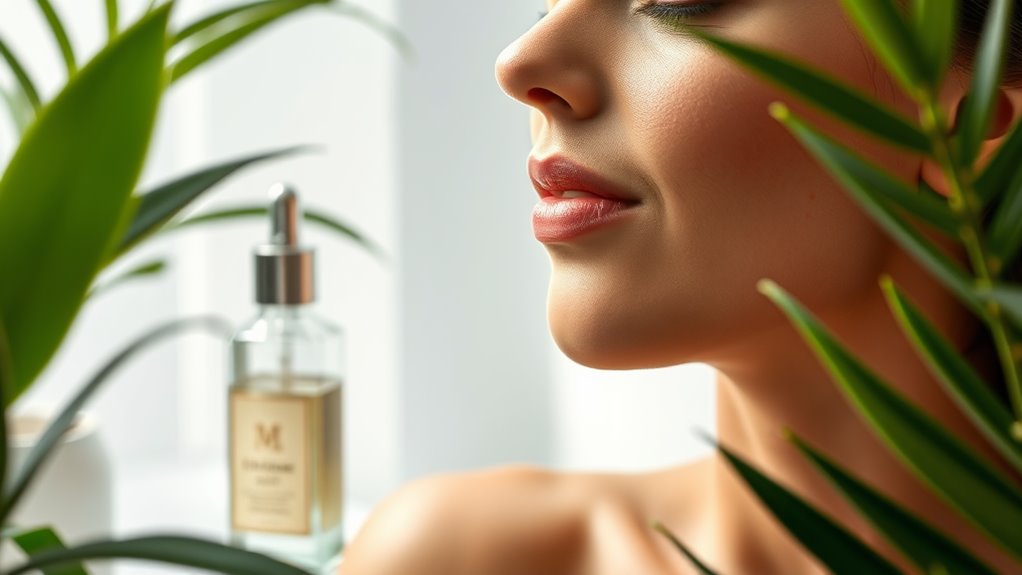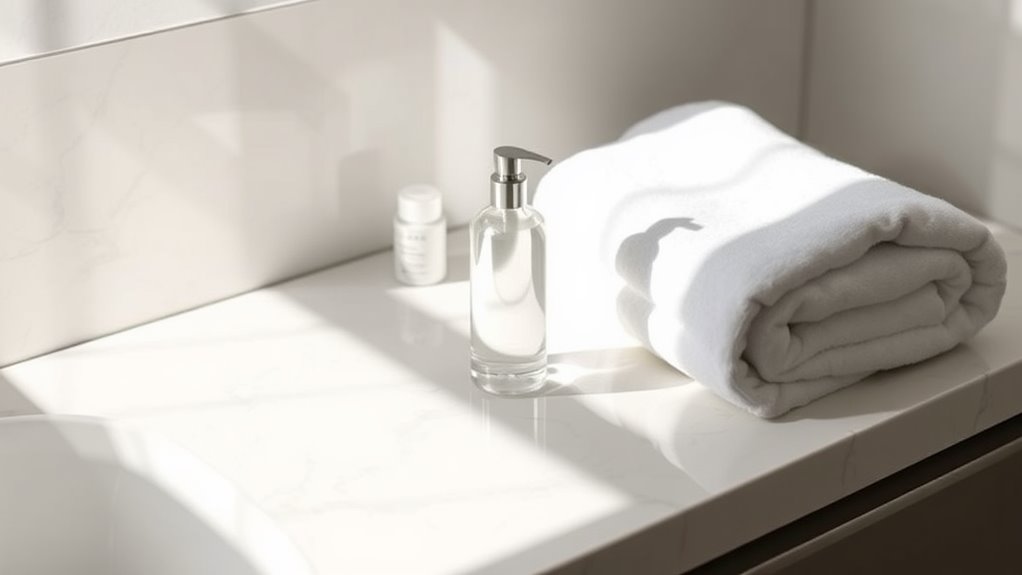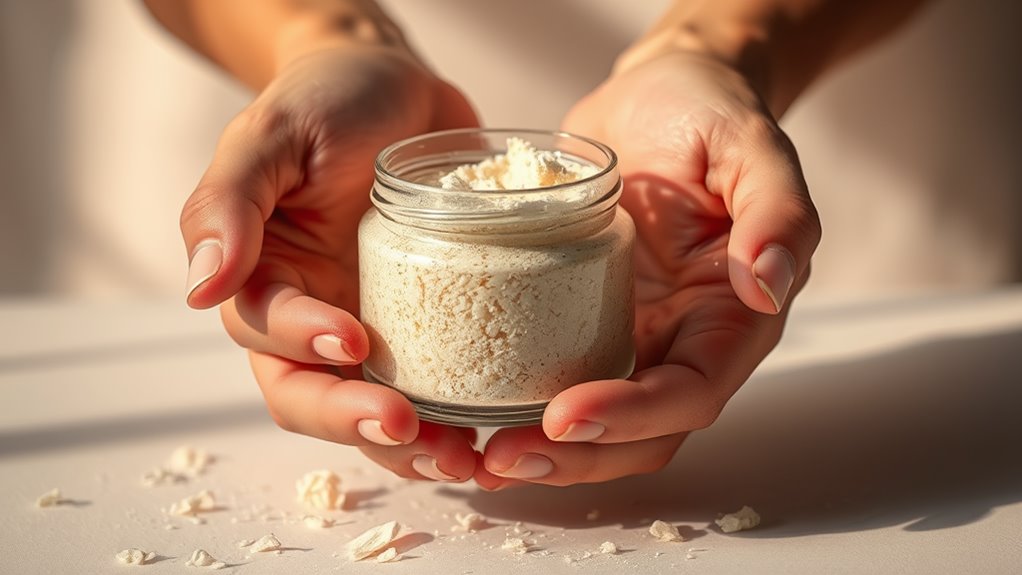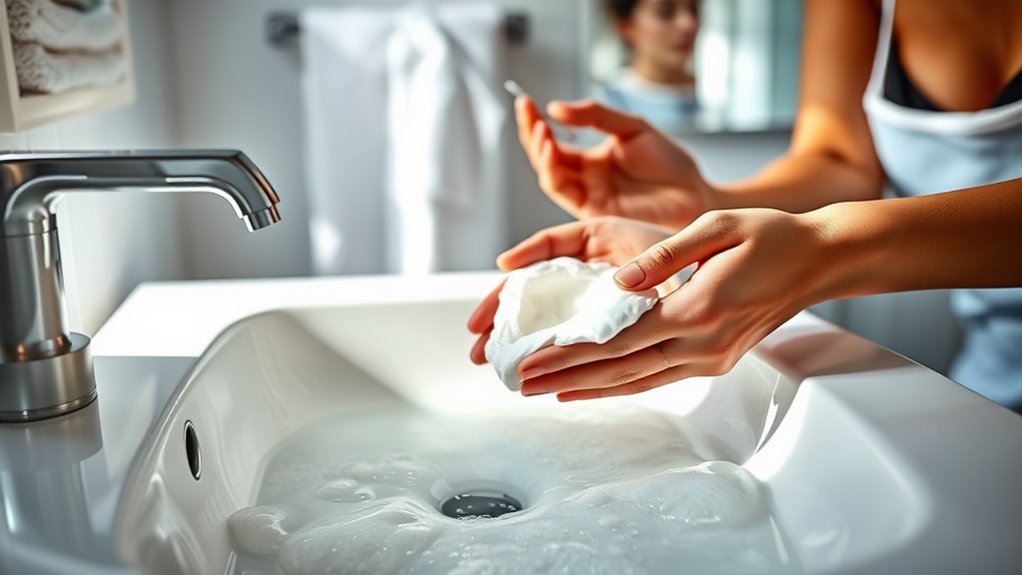Skipping This Step Could Be Ruining Your Skin Barrier
If you skip proper cleansing and moisturizing, you could be ruining your skin barrier. Harsh cleansers strip away natural oils, leading to dryness and sensitivity. Moisturizers, rich in ceramides and fatty acids, create a protective layer to lock in hydration. Without this crucial step, your skin is vulnerable to irritation and environmental damage. To maintain a healthy barrier, it’s essential to follow a consistent skincare routine that supports your skin’s needs. Discover more about protecting your skin barrier.
Key Takeaways
- Skipping moisturization can lead to transepidermal water loss, compromising skin barrier integrity and hydration levels.
- Neglecting gentle cleansing allows irritants to accumulate, further damaging the skin barrier and increasing sensitivity.
- Failing to use sunscreen exposes the skin to UV damage, which disrupts lipid balance and weakens the barrier.
- Over-exfoliating or skipping exfoliation can either irritate the skin or prevent the removal of dead skin cells, hindering skin renewal.
- Ignoring a balanced diet lacking in essential fatty acids and antioxidants can adversely affect skin health and barrier function.
Understanding the Skin Barrier
The skin barrier, often referred to as the stratum corneum, plays a crucial role in maintaining skin health. It acts as a protective shield, preventing transepidermal water loss while blocking harmful environmental aggressors.
To achieve optimal skincare barrier repair, you must focus on its composition, primarily lipids, which include ceramides, fatty acids, and cholesterol. These components work synergistically to enhance barrier function and resilience. Additionally, the skin barrier’s integrity is vital for maintaining hydration levels and protecting against irritants.
When selecting products, prioritize formulations rich in these essential lipids, as well as humectants like glycerin to bolster hydration. Regular exfoliation can also promote renewal, but be cautious; over-exfoliation may compromise the barrier.
Understanding these elements empowers you to make informed choices, ensuring your skin remains healthy and vibrant.
Common Causes of Skin Barrier Damage
When environmental stressors and lifestyle choices collide, your skin barrier can suffer significant damage. Understanding these common causes is essential for effective skin care.
-
Harsh Cleansers: Using products with sulfates or alcohol can strip natural oils, weakening your barrier.
-
Environmental Factors: Pollution, UV exposure, and extreme temperatures can disrupt the skin’s lipid balance, leading to inflammation.
-
Dietary Choices: A lack of essential fatty acids or antioxidants can impair skin health, affecting barrier function. Additionally, using harsh cleansers can lead to long-term issues with your skin’s protective layer.
Addressing these issues is crucial for maintaining a robust skin barrier.
Signs Your Skin Barrier Is Compromised
A compromised skin barrier manifests through several noticeable signs that indicate your skin’s ability to protect itself is weakened.
You might experience increased dryness, leading to a rough texture that feels uncomfortable. Redness and inflammation often accompany this, signaling irritation.
You may also notice heightened sensitivity; products that once felt soothing now sting or burn. Additionally, you could experience breakouts or persistent acne, as a damaged barrier disrupts the skin’s microbiome.
Flaking or peeling skin is another clear indication, revealing that your skin’s moisture retention is compromised. It’s important to note that a damaged barrier can also lead to long-term skin issues if not addressed promptly.
If you observe these symptoms, it’s crucial to assess your skincare routine and environmental factors, as these elements contribute significantly to your skin’s health and barrier function.
The Role of Moisturizers
Moisturizers play a vital role in restoring and maintaining the skin barrier, especially when it’s compromised. They provide essential hydration and lock in moisture, which helps to fortify the skin’s natural defenses.
Here are key functions of moisturizers:
-
Hydration: They deliver water to your skin, replenishing lost moisture.
-
Occlusiveness: They create a protective layer, preventing water loss and shielding against environmental aggressors.
-
Nourishment: They often contain beneficial ingredients like ceramides and fatty acids, which enhance skin elasticity and resilience. Additionally, understanding common misconceptions about moisturizers can help you choose the right product for effective hydration.
Importance of Gentle Cleansing
Gentle cleansing is crucial for maintaining your skin barrier’s integrity. Harsh ingredients can strip away natural oils, leading to irritation and damage. Using the right technique not only protects your skin but also enhances its overall health. Additionally, avoiding common cleansing mistakes can greatly improve your skin’s resilience and appearance.
Harsh Ingredients Damage Barrier
While you may not realize it, using products with harsh ingredients can significantly compromise your skin’s barrier. This disruption often leads to irritation, dryness, and increased sensitivity.
To maintain your skin’s integrity, consider the following:
- Sulfates: These surfactants strip natural oils, leading to a weakened barrier.
- Alcohols: Certain types can be overly drying, exacerbating skin issues.
- Fragrance: Synthetic fragrances can cause allergic reactions and irritation.
Choosing gentle, pH-balanced cleansers is essential for preserving your skin’s barrier. Opt for formulations that nourish rather than strip, promoting a healthy microbiome and moisture retention.
Prioritizing gentle ingredients allows your skin to thrive, ensuring you maintain clarity and resilience in your complexion. Master the art of cleansing with mindfulness toward ingredient selection.
Proper Technique Matters
The way you cleanse your skin plays a pivotal role in maintaining its barrier function. When you use gentle techniques, you minimize irritation and preserve the lipid layer essential for barrier integrity.
Start by applying a suitable cleanser to damp skin, using your fingertips to massage it in with circular motions. Avoid aggressive scrubbing, as this can disrupt the barrier and lead to inflammation.
Rinse thoroughly with lukewarm water, as hot water can strip natural oils. After cleansing, pat your skin dry with a soft towel—don’t rub.
Follow up with a hydrating toner or serum to replenish moisture. Mastering these techniques ensures that your skin remains resilient, reducing the risk of barrier damage and promoting overall skin health.
Benefits of Using a Humectant
How can a humectant transform your skincare routine? By attracting moisture to your skin, humectants play a crucial role in maintaining hydration and enhancing your skin barrier.
Here are some key benefits:
-
Enhanced Hydration: Humectants draw water from the environment and deeper layers of the skin, keeping your complexion plump and moisturized.
-
Improved Texture: Regular use can lead to smoother skin, reducing the appearance of fine lines and rough patches.
-
Increased Product Efficacy: Applying humectants before other products boosts their absorption and effectiveness, maximizing your skincare regimen.
Incorporating a humectant into your routine isn’t just beneficial; it’s essential for achieving optimal skin health.
Prioritize this step to ensure your barrier remains resilient and well-hydrated.
The Impact of Exfoliation
Regular exfoliation plays a crucial role in maintaining a healthy skin barrier by removing dead skin cells and promoting cellular turnover.
Choosing the right exfoliation method tailored to your skin type can enhance these benefits while minimizing irritation.
Understanding these factors will help you achieve optimal results in your skincare routine.
Importance of Regular Exfoliation
While many people focus on moisturizing and protecting their skin, neglecting regular exfoliation can hinder your skin’s health.
Exfoliation is crucial for maintaining a balanced skin barrier, as it removes dead skin cells and promotes cell turnover.
Here’s why you should prioritize it:
-
Enhanced Absorption: Exfoliation allows your serums and moisturizers to penetrate more effectively, maximizing their benefits.
-
Improved Texture: Regularly sloughing off dead skin reveals a smoother, more radiant complexion.
-
Clogged Pores Prevention: Exfoliation helps prevent the buildup of debris that can lead to breakouts and dullness.
Incorporating regular exfoliation into your routine not only revitalizes your skin but also supports overall skin barrier health, ensuring your complexion remains vibrant and resilient.
Choosing the Right Method
Exfoliation methods vary widely, and selecting the right one for your skin type can significantly impact your results.
Chemical exfoliants, like AHAs and BHAs, dissolve dead skin cells and improve texture, making them ideal for oily or acne-prone skin. If your skin is sensitive, consider gentle physical exfoliants or enzyme-based options, which are less abrasive.
You’ll want to avoid over-exfoliating, as this can compromise your skin barrier, leading to irritation and inflammation. Tailoring your exfoliation frequency to your skin’s needs—typically once or twice a week—is crucial.
Monitor how your skin reacts and adjust accordingly. Ultimately, mastering the right exfoliation technique enhances your skin’s health, promoting a radiant complexion while safeguarding your skin barrier.
Incorporating Antioxidants
Incorporating antioxidants into your skincare routine can significantly enhance your skin barrier‘s resilience and overall health.
These powerful compounds help neutralize free radicals, reduce inflammation, and promote cellular repair. By adding antioxidants, you’re not just protecting your skin; you’re also fostering a more vibrant complexion.
- Vitamin C: Stimulates collagen production and brightens skin tone.
- Vitamin E: Provides moisture and protects against environmental stressors.
- Ferulic Acid: Boosts the stability and efficacy of other antioxidants.
To effectively integrate antioxidants, look for serums or creams that contain these ingredients.
Apply them in the morning for optimal protection against daily aggressors.
Prioritize consistent use to reap the long-term benefits for your skin barrier.
UV Protection and Skin Barrier Health
UV protection is essential for maintaining skin barrier health and preventing long-term damage. Ultraviolet rays can compromise your skin’s lipid matrix, leading to transepidermal water loss and increased sensitivity.
To fortify your barrier, it’s crucial to apply a broad-spectrum sunscreen with at least SPF 30 daily, even on overcast days. This protects against both UVA and UVB radiation, which can trigger oxidative stress and inflammation.
When selecting a sunscreen, look for ingredients like zinc oxide or titanium dioxide for physical protection, or avobenzone for chemical absorption. Reapply every two hours, especially after sweating or swimming, to ensure consistent protection.
Lifestyle Factors Affecting Your Skin Barrier
Your skin barrier is influenced by a variety of lifestyle factors that can either enhance or compromise its function.
Understanding these elements is crucial for maintaining optimal skin health.
-
Diet: A diet rich in antioxidants and healthy fats supports skin barrier integrity.
-
Hydration: Adequate water intake is vital for maintaining skin moisture levels.
-
Stress Management: Chronic stress can lead to inflammation, negatively affecting your skin barrier.
Developing a Consistent Skincare Routine
Establishing a consistent skincare routine is crucial for maintaining your skin barrier’s health.
By selecting key products tailored to your skin’s needs and applying them daily with proper techniques, you can significantly enhance your skin’s resilience.
Let’s explore the importance of consistency and the best practices for product selection and application.
Importance of Consistency
While it may be tempting to switch up your skincare products frequently in search of the perfect solution, consistency in your routine is crucial for maintaining a healthy skin barrier.
A stable regimen allows your skin to adapt and respond effectively to treatments, leading to improved resilience and overall health.
-
Regular application helps in rebuilding and strengthening the skin barrier.
-
Consistent use of products can enhance their efficacy, leading to noticeable results.
-
A predictable routine minimizes the risk of irritation and adverse reactions.
Key Product Selection
Selecting the right products is essential for developing a consistent skincare routine that effectively supports your skin barrier. Focus on ingredients that enhance barrier function, such as ceramides, fatty acids, and cholesterol.
Incorporate gentle cleansers that maintain pH balance without stripping natural oils. Exclude harsh exfoliants and fragrances that can compromise barrier integrity.
Choose hydrating serums containing hyaluronic acid to retain moisture, and opt for occlusives like squalane or shea butter to lock in hydration.
Regularly assess your skin’s response to products, adjusting formulations as needed. Consistency in product selection allows your skin to adapt and thrive, promoting optimal barrier health.
Prioritize quality over quantity to ensure each product contributes meaningfully to your routine.
Daily Application Techniques
To effectively develop a consistent skincare routine that supports your skin barrier, it’s crucial to master daily application techniques. Proper application not only enhances product efficacy but also minimizes irritation, ensuring your skin remains healthy.
-
Layer Products Wisely: Apply from thinnest to thickest consistency for optimal absorption.
-
Use Gentle Motions: Pat or press products into your skin rather than rubbing to prevent damage.
-
Follow Timing Guidelines: Allow each layer to absorb before applying the next; this maximizes benefits.




